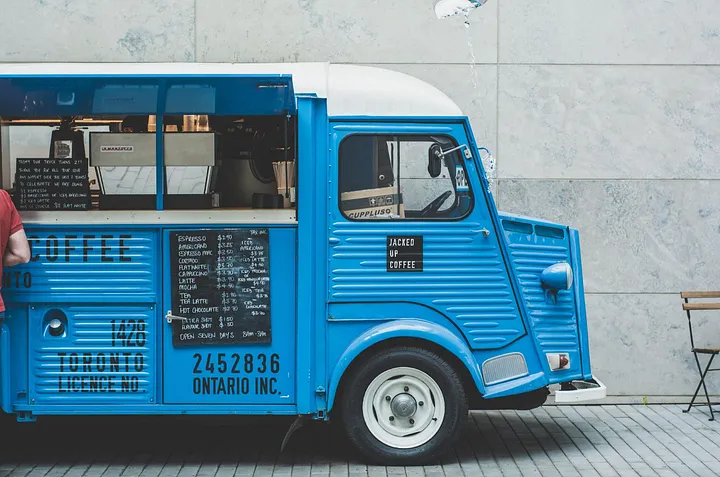
How to Start a Food Trailer Business?
Learn how to start a food trailer business with our step-by-step guide. Discover tips on setup, licensing, marketing, and growing your food trailer venture!
Do you love savoring those bagels and hot dogs from the trailers on the way? I do too! These delicious treats do wonders to satisfy your hunger when you’re in a hurry.
Are you wondering how to start a food trailer business? Well, then you’ve reached the right place. Here’s a detailed guide for you!
How often do you stop by an ice cream truck to escape the summer heat? I bet the answer is countless times a day!
When at a festival, do you prefer to quickly grab food from the nearby food trucks or dine in at a restaurant? The food truck — of course!
Well, what do these common things about yourself indicate? A food trailer business has a huge customer base!
According to Zippia, the food truck industry has grown by a whopping 9.9% every year from 2016 to 2023. It had a value of $1.49-billion in 2023 (0.15 billion more than in 2020).
The food truck businesses have picked up really well immediately after the year of pandemic.
That’s a huge eye-opener for anyone who wants to start a business!
So, if you’re someone who loves food and has an entrepreneurial passion, this mobile food business is a good idea.
In today’s article, we’ll walk you through every step required to set up your own food truck business. We’ll also discuss how to increase profitability by proven tactics. So, without further ado, let’s get started!
Why Should You Start a Food Trailer Business?
Fast food restaurants — the mightier alternative to a food truck business is also present. You can choose that too.
So, why am I suggesting you a food trailer business? The reasons will surprise you.
1. The food truck business has low startup costs.
A brick-and-mortar restaurant may seem like a fancy and highly profitable business to start. It may as well be. But, it comes at a great cost.
You can expect to invest anywhere from $175,500 and $750,500 in the building only. The cost will increase as you add equipment, supplies, and team.
Comparatively, new mobile food establishments come in a range of $75,000 to $150,000. The price drops between $40,000 to $80,000 if you buy a used truck.
2. it’s portable.
The location is everything for a restaurant business. If you don’t have a great place, there will be no customers, no sales, and no profits. Your business will be doomed.
Fortunately, location doesn’t stand as a hurdle for food truck owners. Their business is portable.
So, they can switch locations according to the traffic and special events.
It means you’ll never end up with a no-sales day!
3. You advertise wherever you go.
Another benefit of owning a mobile food truck business is free, effortless advertisement. Your moving truck serves as your brand’s billboard.
It will automatically grab everyone’s attention when you set it up in different locations. The mere passing by will cause people to look up and find out what it is.
Curiosity may kill the cat. But, for your business, it means more customers and dollars.
4. Menu experimentation is easier.
Experimentation is a big part of any new business. There’s a whole process of trial-and-error in which you make changes in the product/service to check the response. In simple words, you find out what the customers love.
For food truck businesses, doing this experimentation is simple and easy. They can shift menu items on a regular basis without worries. However, restaurants cannot do that.
They will have to change their massive inventories and face the loss of wasted materials. Plus, their customer base will suffer because people come to a restaurant for a specific food. If it keeps on changing, they will stop coming.
What Types of Food Trailers Make the Most Money?
Before you dive into the details of business building, let’s first decide what type of food truck you will set up.
There are two ways to go about this; passion and profit. If all you care about is making your favorite comfort food available to people like you, then the sky’s the limit. Go ahead and start any new food truck.
But, if money is one of your concerns, why not look at the types of food that bring in the most profits?According to research, the most successful food trucks in the United States sell:
● Gourmet Burgers
● BBQ
● Tacos
● Mac & Cheese
● Grilled Cheese Sandwiches
● Seafood
● Vegan food
However, there are plenty of other popular options, including:
● French Fries
● Hot Dogs
● Ice Cream & Waffles
● Donuts
● Stoned Baked Pizzas
● Indian Cuisine
● Fresh Juices
Although it is suggestible to keep your food truck menu small (we’ll discuss why later!), you can double the figures by selling different popular food items. For example, a gourmet burger food truck can also sell fries, tacos, and hot dogs.
How Much Money Does a Food Truck Make?
A food trailer is a highly profitable business venture.
In densely populated cities, food trucks make an average of $20,000 to $50,000 in sales every month. Meanwhile, in other cities, sales can be anywhere from $5,000 to $16,000 per month.
However, the exact figures you make depend on your planning process and strategy. Read more to find out how to nail these important business aspects!
How to Start a Food Trailer Business? A Step-by-Step Guide
Starting a new business is never easy. It’s risky, scary, and most importantly, filled with uncertainty. You have no idea where to begin.
It’s why I’ve compiled this detailed step-by-step guide on how to start a food trailer business. By the end of this, you’ll hopefully have a clear direction for a successful business!
Come Up With an Innovative Idea
There are hundreds and thousands of food truck businesses. Your area probably has 2 to 3 successfully running food truck operators too. So, in all this competition, how will your small business stand out?
The answer is innovation!
Innovation in business is present in 2 forms. You either create a unique product/service OR you come up with a unique way to solve an existing problem.
What does that mean for your food truck business? It means that you should focus on creating an innovative product for your new business. Make it different from what is already available in the market.
If you’re selling smash burgers, what’s going to make it a better, if not the best option, for the customer? Is it the quality of ingredients, taste, or fancy packaging?
Pick out this unique point and write it down somewhere. Your whole food truck business plan and marketing strategy will revolve around it.
Research the Legal Requirements
There are different local laws for the food industry in different states. So, before we get too serious about your exciting new business idea, let’s research its practicality.
General Food Permits & Licenses
Here are the necessary permits and licenses required by food trailers throughout the USA.
● Business License
Also called vendor license, this is the basic license required to operate any type of business. It makes your business entity legal and allows the government to track the financial records for tax purposes.
With this license, small business owners can also qualify for loans easily. Your income will be considered eligible for both personal and small business loans. The fees for the license vary from $50 to $500.
● Employer Identification Number
The Employee Identification Number (EIN) usually comes along with the business license. It’s the federal tax ID number that allows you to create a business bank account.
You can also make a credit profile and hire team members.
It has no separate fees. In case you don’t receive it with the license, apply for it through the website or mail. You’ll receive it within four weeks.
● Food Safety License
A food safety license is mandatory to let people know that your business understands and practices safety measures. It is also called a Food Handler’s License and Food Manager Certificate.
Usually, the manager on the premises of the restaurant is required to obtain the license.
However, some states may require most of the employees to have a license too. It can change how you hire the staff and operate.
So, do give the local regulations of your state a check. The food safety license involves an inspection from the health department and typically costs $50 or less. It will remain valid for up to 5 years.
● Vehicle License
Apart from health permits, you will also need to obtain a vehicle license. It’s simply because you’re constantly on the go, unlike other small businesses.
Your vehicle driver should have proper training and a commercial driver’s license.
● Fire Certificate
Food preparation on a truck means there are high chances of a fire hazard. Most US states will require you to get a fire certificate before starting the food truck scene.
Legal Food Truck Requirements by City
US states have slightly different business laws when it comes to public health, transportation, and overall registration. Some are more rigid, and some are not.
Here’s a chart of the easiest cities to operate in as a food truck business.
Create a Detailed Business Plan
Now that you’ve researched the legal requirements, you’ll have a pretty good idea of whether it’s possible to start a food trailer business in your state.
It’s time to make a solid business plan.
It refers to a written document containing the objectives, financial expectations, operations, and other relevant details of a business. It’s basically a thorough outline and guide.
Typically, you will want to include the following in your business plan.
Business Legal Structure
The legal structure determines the way your entire business will function.
How will you handle the business and personal assets? Who will be the shareholders? How many meetings will there be? All such questions are based on what type of structure you choose.
● Sole proprietorship
You’ll be the sole owner of the business and will have complete command. However, this also means that you’ll be held responsible for all the bad stuff like accidents.
● Partnership
A partnership enables two or more individuals to run a business together. While this splits control, it also lessens the burden of loss. In case of bad incidents, the co-founders can mutually work to find solutions.
● Limited liability company (LLC).
An LLC offers liability protection within the business. It means your professional and personal assets remain separate. So, if a food truck fails somehow, the private property and assets of the owners will not be affected.
Most food truck owners prefer to establish an LLC structure. It allows them to pursue the new venture without great financial risks.
Name & Brand Personality
The next step is to finalize a name. Please note a business name holds great value. It can either give you a good head start or set you back several positions.
We say this because the name is the first thing potential customers hear. If a name is distinctive and relatable, it will stick in their minds and encourage them to learn more. Otherwise, they’ll move on to another truck!
Along the same lines, deciding on what your brand personality will be is also very important. Brand personality is the feel and overall vibe of your food truck business. It helps attract the target market and establish trust.
In simple terms, people respond better when your brand personality defines what you sell and how you behave with the customers.
Objectives & Aims
The business plan should include a detailed section mentioning the goals of your food truck.
Talk about what things you want to achieve in a specific time period. Also, note plans and strategies that you’ll follow in order to achieve them.
For example, increase sales by 15% at the end of (year). How?
➔ introducing a (new food item).
➔ Participate in the (events and festivals in your city).
➔ Run a (promotional campaign).
Gather Financial Capital
No business starts with zero investment. And, when talking about food truck businesses, you’ll require substantial financial capital to get started.
Plan A: How much money does a food truck business cost?
The first step to gathering financial capital is to calculate your costs. Generally, you should expect a minimum range of $28,000 to $114,000. But that’s very wide.
You cannot possibly rely on it alone to start a venture. So, it’s best to take a notepad or
calculator, and find the most accurate estimated range as per your business needs. Here’s how to do that:
1. Find the Truck Cost
The food trailer will take a huge chunk of your investment. We’ve already mentioned that a new truck can cost between $75,000 to $150,000. You can lower it down by opting for lease or used trucks.
A used food trailer with huge space and good condition equipment can cost you $80,000 at most. Visit eBay or UsedFoodTrucks to browse your options.
Additionally, you should consider the customization, truck insurance, and license costs for the vehicle. Keep aside a minimum budget of $2000 to $4000 per annum for this.
2. Estimate the Inventory Cost
You’ll need a lot of new commercial equipment depending on what you’re selling. It includes supplies for food prep, cooking, serving, and storing. You must also have janitorial tools at hand.
In case you buy a used truck that comes with all these things, the costs will be greatly reduced. Other than this, expect a minimum expense of $1000 to $3000.
3. Hiring & Marketing Budget
Many businesses ignore this important part of the required budget. They usually put it off for later when their business starts to see some growth. But, here’s the thing.
Your food truck business won’t really see any growth until you invest in it. Hiring a team and advertising are some key ways to expand the business. And, yes, that requires some money.
So, even if you’re starting out with a tight budget, try to set aside some amount for these growth elements. It’ll also serve as your backup when things go down!
Plan B: How to Start a Food Truck without Money?
It’s okay to not have huge financial capital already available to start a business. Not everyone is born a millionaire, and not everyone can save such amounts. So, how do you start a food trailer business without money?
The best way is to find potential investors and pitch them your idea. These can be anyone from your work colleagues to family members.
Your detailed business plan will do wonders to convince people. If that doesn’t seem suitable, go for crowdfunding platforms like Kickstarter. Many popular businesses started from there. You can too!
Another great way is to get a business credit card. However, it’ll have limits depending on your business type, structure, and previous history.
You can also approach a financial institution that offers food truck loans or any other supportive program.
Purchase a Food Truck & Supplies
When you’ve gathered the capital, do a little research about everything required. For example, do not just go and buy any food truck that you find within the budget. Most dealers can trick you into scams and bad deals.
Instead, do the homework and visit the truck for inspection. Go through its own documents and seal the deal when all seems fine. You won’t want to dive into such details for supplies.
But, you will want to purchase from a reputable wholesale company. You should also ensure the equipment comes with a guarantee.
Set Up a Payment System
Debit and credit cards are the standard form of payment. It doesn’t matter whether you’re selling a hotdog worth $10 or an Indian Cuisine platter worth $50. People don’t carry cash around for practically anything nowadays.
So, it’s important to set up a point of sale system (POS). It allows you to receive payments through cash easily. However, you require a stable internet connection and a device.
We suggest you browse through the best pos systems to select the best one. People usually prefer the Toast system because it enables your customer to order and pay through the phone directly.
How to Grow Your Food Trailer Business?
In any business, things are pretty much linear until the launch. You focus on the production aspect only.
After launch, however, things become a bit complicated. You focus on the expansion and growth of the launched product. And that isn’t a linear route.
So, as we begin to guide you through the ABCs of growing your food trailer business, we ask you to brace yourself. Things might get a bit tricky and demanding, but rewarding nonetheless.
Route A: Physical Marketing
Since you have a physical product with a physical site, we recommend investing in physical marketing as your primary means of growth. The people in your vicinity are your target audience.
You want them to know about you and try out your food.
Therefore, you should invest in acquiring their attention. You can do so by working on the banners on your food truck and distributing flyers now and then.
You can paste stickers on storefronts, advertise in newspapers and magazines, or consider guerilla marketing if you’ve got the budget.
You can also promote your business in local food festivals or nearby malls. Since a lot of people gather here for long hours, these are great places to get more exposure.
But the key in this type of physical marketing is to introduce your range of food products to more people and redirect them to your original food trailer (not day-to-day profits!).
For that, we recommend setting up a small-sized stall-like concession stand. Sell 1–2 of your best food products and share a brochure or menu card, urging customers to visit your original food trailer.
By doing so, the investment is minimal, and the reach and subsequent profits are maximal.
Here are nine more physical marketing strategies that you can explore
Alternative to traditional marketing, you can grow your business digitally. In the current times, most small-scale businesses prefer digital marketing over physical marketing because it cuts down costs significantly.
How so? Well, social media doesn’t cost a penny. It’s free.
You can begin marketing your concession trailer business by sharing posts that compel your target audience to try out the food you offer.
Certainly, a robust marketing plan with proper keyword search and paid advertisements will boost your profits significantly.
But if you haven’t got the budget, you can begin by posting on Instagram regularly.
Frequently Asked Questions
Is a food truck a good business?
Yes, a food truck is a very good business idea. It can easily generate $500,000 or more in sales every year. Plus, it requires a small investment.
Why do food trucks fail?
The fundamental reason why food trucks fail is poor financial management. Many people do not calculate the estimated costs properly. They only take the vehicle, food, and supplies cost into account.
But, they do not consider the licenses, insurance, hiring, and marketing budgets. They are also unable to get the cost of operations under control
What are the 3-disadvantages of a food truck business?
Small spaces, local state restrictions, and high competition are thought to be the biggest disadvantages of a food truck business.
But, they’re easy to overcome with good planning.
For example, if you research the best locations for a food truck, you can easily avoid starting a business in a city with strict laws and high competition.
A good budget calculation can help to raise capital that covers the cost of a big truck. It all depends on your planning!
Just Get Started!
All in all, starting and running a food trailer business is not difficult. You should devise the plan and research thoroughly. If you do these two things, nothing can actually stop you from climbing the ladder of success (or perhaps, parking lots in this case!).
So, what are you waiting for? Consider our detailed how-to start a food trailer business your ultimate guide and get this food truck craze started!




